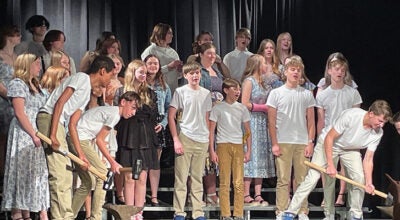No on calendar changes; Board to discuss issue again April 25
Published 10:54 am Tuesday, March 29, 2016

Derik Gustafson presents to members of the Austin Public Schools Board the Calendar Work Group’s findings from the community survey and interviews they conducted about a balanced calendar or later start time. — Photos by Jenae Hackensmith/jenae.hackensmith@austindailyherald.com
A committee exploring calendar options and start times told the Austin Public Schools Board Monday that the community likely doesn’t have the support to explore calendar or start time changes right now.
Austin’s Calendar Work Group recommended the Austin Public Schools Board not make any changes to the district calendar or the start time currently. A group vote on whether to recommend the school board continue to look at these options or not for a balanced calendar was 50 percent yes and 50 percent no, while a vote for a later start time was about 18 percent yes and about 82 percent no.
“At this time, based on the public survey results and information gathered by this survey committee, it does not appear public support is strong enough to successfully pursue a calendar change or a later start time,” the group concluded in a written statement.
Group leaders presented the final vote with other members of the group, and they presented what they found during the regularly scheduled school board meeting Monday after a communitywide survey and interviews with stakeholders about a balanced calendar or a later start time.
“What we gave them was a really in depth, broken apart, ‘This group responded this way,’ and ‘This group responded this way,’ and really at this point now I think our group’s given the board our recommendation and what they do with it is up to the board,” said Derik Gustafson, a committee leader and the technology integration coach at Ellis Middle School.

Members of the Austin Public Schools Board listen as members of the Calendar Work Group present their findings from the community survey and interviews they conducted about a balanced calendar or later start time.
For the last few years, a committee of about 50 community members — parents, teachers, students, school-board members, community members, business owners and others — researched different options for a school’s yearly calendar, as well as other options, such as start time, that could help students. The second calendar committee, which consisted of about 35 members similarly diverse to the first group, took a more in-depth look at things such as how the busing schedule would work or how activities such as sports or 4-H would be effected.
Though the school board took no action Monday, school board Chairwoman Angie Goetz said it wouldn’t make sense for the district to make any big changes at this point.
“I feel like to make any kind of a districtwide change right now would be a mistake,” she said. “We respect our community and their thoughts and opinions, so I don’t think a districtwide change right now would be a good decision.”
The district’s calendar survey received 1,252 responses, 56 percent identified as parents. The survey results showed a slight favorability towards a balanced calendar, with 49 percent in favor, 38 percent opposed and 13 percent neutral.
The results showed a slight favorability toward a later start time, with 48 percent in favor, 33 percent opposed and 19 percent neutral.
“Some of that favorability really resonates with student achievement and student health with a districtwide balanced calendar and later start times,” said Jill Rollie, a calendar committee leader and the I.J. Holton Intermediate School Continuous Improvement Specialist. “But there was opposition as well, and that really revolved around family schedule and extra curricular activities.”
Yet the survey did not show everything, as the interviews with stakeholders played a big role. Things like busing, for example, would be highly affected by both a balanced calendar and a later start time. Gustafson was surprised at how the busing situation would change.
“The busing for me was a big one,” he said. “Not being involved in that business and the logistics of how that works was surprising to me.”
Along with busing, the group also looked at things like athletics and extra-curricular activities, maintenance, academics, family, businesses and seasonal work, summer programing, and staff and students. Gustafson noted many of the stakeholders were flexible and willing to change if need be to make things work regardless of the calendar or start time.
Rollie emphasized this conclusion does not invalidate the first Calendar Committee’s results, which were based purely off research of how a balanced calendar or a later start time have done in other schools, and what the benefits and non-benefits were. That group recommended last year the board continue to look into the options. The second group focused less on research and more on how the community and stakeholders felt about the options.
“We are the worker bees to inform, gather that information and then just present our findings,” Rollie said. “After all of that, our group drew a conclusion.”
Rollie noted how thankful she was that people came together for both the first Calendar Committee and the second Calendar Working Group and volunteered their time and energy researching, gathering information and finding out what’s best for students.
“I just can’t emphasize enough how awesome that really is that people committed to that time to put towards making sure that our districts are providing the best services for our students,” she said.
The board will discuss the results of the survey again at its next work session on April 25.
“We didn’t have much time to discuss today so we’re going to take our next work session and kind of hash through this survey data, because there was more support in favor of a change in our calendar than there was opposed to it, and we’re going to look at the data and just see what our next steps might be,” Goetz said.
Though there is no change scheduled currently, Goetz said anything that gets people talking about what is best for students is a good thing.
The survey results and more information from the Calendar Work Group are available in a google folder at www.drive.google.com/open?id=0B-scOJ0aSC9cM2taU3FJbHRGYzA.





